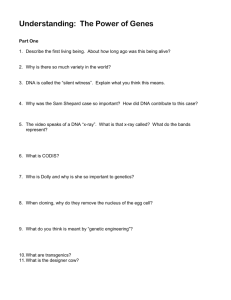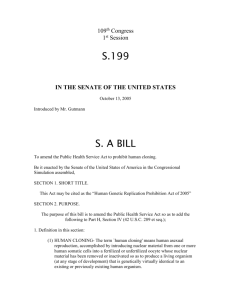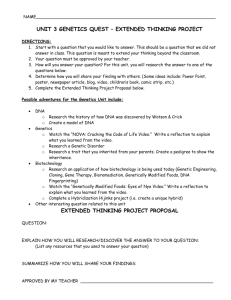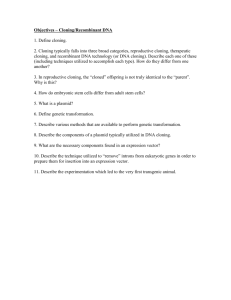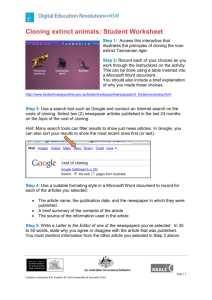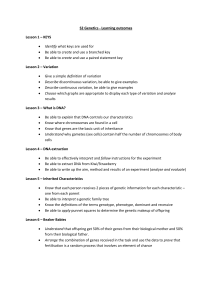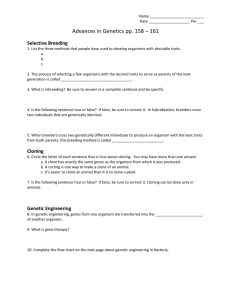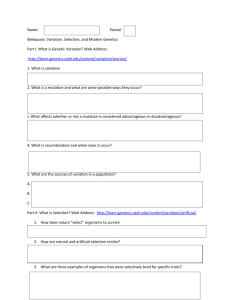Genes: The Building Blocks of Life
advertisement
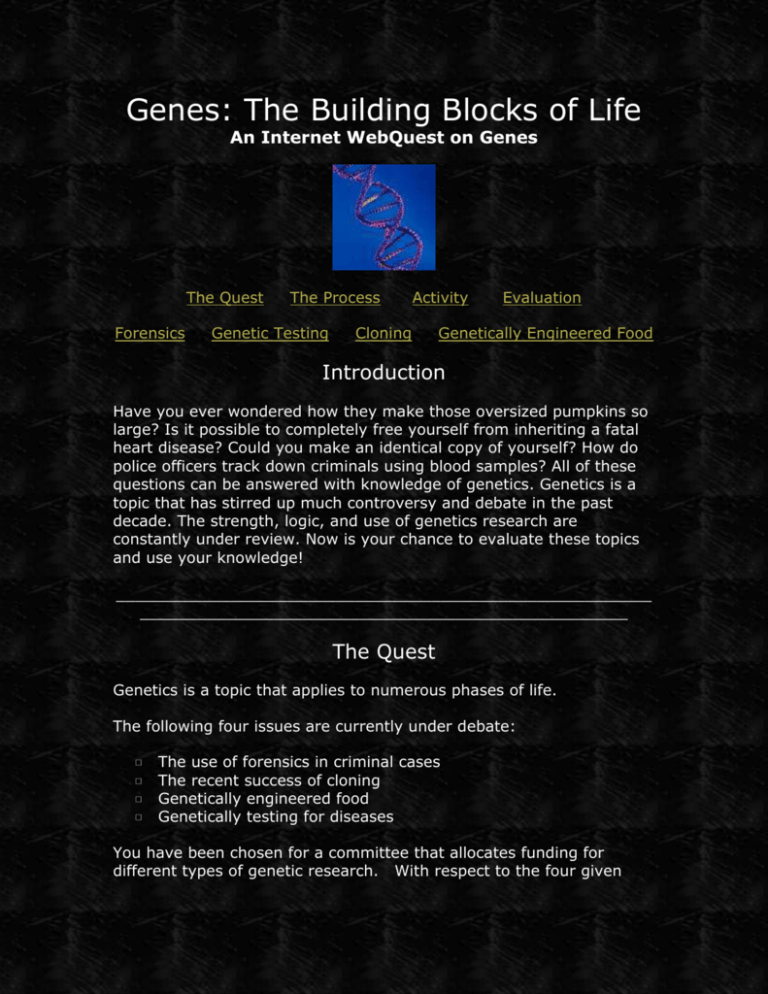
Genes: The Building Blocks of Life An Internet WebQuest on Genes The Quest Forensics The Process Genetic Testing Activity Cloning Evaluation Genetically Engineered Food Introduction Have you ever wondered how they make those oversized pumpkins so large? Is it possible to completely free yourself from inheriting a fatal heart disease? Could you make an identical copy of yourself? How do police officers track down criminals using blood samples? All of these questions can be answered with knowledge of genetics. Genetics is a topic that has stirred up much controversy and debate in the past decade. The strength, logic, and use of genetics research are constantly under review. Now is your chance to evaluate these topics and use your knowledge! ________________________________________________________ ___________________________________________________ The Quest Genetics is a topic that applies to numerous phases of life. The following four issues are currently under debate: The use of forensics in criminal cases The recent success of cloning Genetically engineered food Genetically testing for diseases You have been chosen for a committee that allocates funding for different types of genetic research. With respect to the four given aspects of genetics, should funding for each of the research topics be continued? Why or why not? ________________________________________________ ___________________________________________ The Process Forensics: 1. What is ‘Forensics?’ 2. What are some advantages and disadvantages of using genetic forensic evidence in criminal court cases? 3. Is using DNA in forensics a well researched form of identification? If not what future research is required? 4. Pro/Con List DNA Fingerprinting in Human Health and Society http://www.accessexcellence.org/AB/BA/DNA_Fingerprinting_Basics.ht ml An Interview with DNA Forensics Authority Dr. Bruce Weir http://www.accessexcellence.org/AB/BA/Interview_Weir.html Use of DNA in Identification http://www.accessexcellence.org/AB/BA/Use_of_DNA_Identification.ht ml Forensic Technique http://www.trutv.com/shows/forensic_files/techniques/index.html How Crime Scene Investigation Works http://science.howstuffworks.com/csi.htm Crime Scene Response http://www.crime-scene-investigator.net/csi-response.html Evidence Collection Guidelines http://www.crime-scene-investigator.net/collect.html Crime Scene Search Technique http://www.fbi.gov/hq/lab/handbook/intro16.htm Forensic DNA http://www.dna.gov/basics/ Crime Scene Investigation: A Guide for Law Enforcement http://www.ncjrs.gov/pdffiles1/nij/178280.pdf Forensics Glossary http://www.trutv.com/shows/forensic_files/glossary.html Genetic testing for unborn children: 1. What is genetic testing? 2. Is genetic testing of prenatal babies harmful to the health of the babies and/or the mothers? 3. How do genes determine the characteristics you get from your mom and dad? 4. How reliable is genetic testing in predicting diseases? 5. Pro/Con List Genetic Science Learning Center: Tour of the Basics (Click on What is Inheritance?) http://gslc.genetics.utah.edu/units/basics/tour/ Understanding Gene Testing (Click the Next Button and read through the section entitled What are Today's Options?) http://www.accessexcellence.org/AE/AEPC/NIH/gene09.html Carlos and Molly Can Have a Perfectly Healthy Baby (or can they?) http://ehrweb.aaas.org/ehr/books/4_carlos.html Human Genome Project: Genetic Disease http://www.ornl.gov/sci/techresources/Human_Genome/medicine/assi st.shtml US Department of Health and Human Services http://www.hhs.gov/ Genetic Disorder Library http://learn.genetics.utah.edu/content/disorders/whataregd/ Genetics Home Reference http://ghr.nlm.nih.gov/ Tyler Medical Clinic http://www.tylermedicalclinic.com/diseases.html Medicine Net http://www.medicinenet.com/genetic_disease/article.htm Cloning: 1. How does cloning work? 2. Is cloning humans realistically possible in the next ten years? If so, should research be continued? 3. Is it ethical to clone humans? 4. Since cloning is such a new phenomenon, what are the possible problems of research in this area? 5. Pro/Con List WhyFiles? - Cloning Animals (Read all 11 pages) http://whyfiles.org/034clone/index.html ThinkQuest Entry: Conceiving a Clone (Read all 4 links under Reactions) http://library.advanced.org/24355/ Essay on Cloning http://www.nimr.mrc.ac.uk/MillHillEssays/1997/cloning.htm Cloning: Ethical Concerns http://www2.worldbook.com/features/cloning/html/ethics.html Human Genome Project: Cloning http://www.ornl.gov/sci/techresources/Human_Genome/elsi/cloning.s html Genetic Science Learning Center: Cloning http://learn.genetics.utah.edu/content/tech/cloning/ National Human Genome Research Institute http://www.genome.gov/25020028 US National Library of Medicine http://learn.genetics.utah.edu/content/tech/cloning/ How Cloning Works http://www.howstuffworks.com/cloning.htm The History of Cloning http://www.msnbc.com/news/wld/health/brill/cloningtimeline.htm American Medical Association http://www.ama-assn.org/ama/pub/category/4560.html Genetically engineering crops: 1. What does it mean to genetically engineer a crop? How does the process work? 2. How are genetically altered crops beneficial to society? 3. Are there any harmful effects of genetically altered crops? 4. Pro/Con List Why Files? - Field of Genes (Read all 6 pages) http://whyfiles.org/062ag_gene_eng/index.html Designer Seeds (Read articles 1 through 4) http://www.beyonddiscovery.org/content/view.article.asp?a=167 The Allliance for Better Foods: The Promise of Biotechnology http://www.betterfoods.org/Promise/Promise.htm The Safety of Genetically Engineered Foods http://www.psrast.org/defknfood.htm US Food and Drug Administration http://www.fda.gov/fdac/features/2003/603_food.html Global Issues http://www.globalissues.org/issue/188/genetically-engineered-food ProQuest http://www.csa.com/discoveryguides/gmfood/overview.php Center for Food Safety http://www.centerforfoodsafety.org/geneticall2.cfm Human Genome Project: Engineered Food http://www.ornl.gov/sci/techresources/Human_Genome/elsi/gmfood.s html American Institute of Biological Sciences: The Debate http://www.actionbioscience.org/biotech/sakko.html ________________________________________________________ ____________________________________________________ Activity You have all learned about a different part of genetics. Now in your group, discuss each of your aspects. Weigh the pros and cons of each part. Work together to come to an agreement about rather or not genetic research should be continued in the four topics. Due to the fact that each of you researched a different area of genetics, your viewpoints may be dissimilar. Use the knowledge you acquired from your research to convince your teammates that your viewpoint is important and should be part of your team's answer. Your team should write out an answer that everyone on the team can live with. Real World Simulation Now that your team has come to an agreement, you can develop a persuasive argument. Use PowerPoint to create an oral and visual presentation stating your decisions; which areas of genetic study are you going to continue to fund and which ones are you going to stop funding? Your presentation should be focused on convincing the rest of the class to agree with your decision. Slide 1: Introduction Slide 2: Forensics /Briefly explain the process Slide 3: Pros Slide 4: Cons Slide 5: Your decision about Forensics /Should it be funded? Slide 6: Genetic testing/Briefly explain the process Slide 7: Pros Slide 8: Cons Slide 9: Your decision about Genetic testing /Should it be funded? Slide 6: Cloning /Briefly explain the process Slide 7: Pros Slide 8: Cons Slide 9: Your decision about cloning /Should it be funded? Slide 6: Genetically engineering crops/Briefly explain the process Slide 7: Pros Slide 8: Cons Slide 9: Your decision about Genetically engineering crops /Should it be funded? ________________________________________________________ _________________________________________________ Evaluation The purpose of this WebQuest is for you to gain a concrete knowledge of the following aspects of genetics: genetic testing, genetically engineered food, forensics and DNA, and cloning. The main goal of the research is to answer the following question: "Should these elements of genetic research be funded?" You should also come away from this lesson with efficient group work skills, an understanding of PowerPoint, consensus building techniques, and the ability to create a persuasive argument. The main product of all of your research and teamwork is the PowerPoint presentation. The presentation will be judged based primarily on the content of the presentation, and not solely on the quality of the PowerPoint presentation (since the details of PowerPoint were not focused on in this lesson). All four aspects of genetics should be addressed along with if you believe it should continued to be funded, based on your group's agreement. Your presentation should have solid, specific supporting research for why your group arrived at your decision, including advantages, disadvantages, and explicit examples. Click here to see the evaluation rubric.
